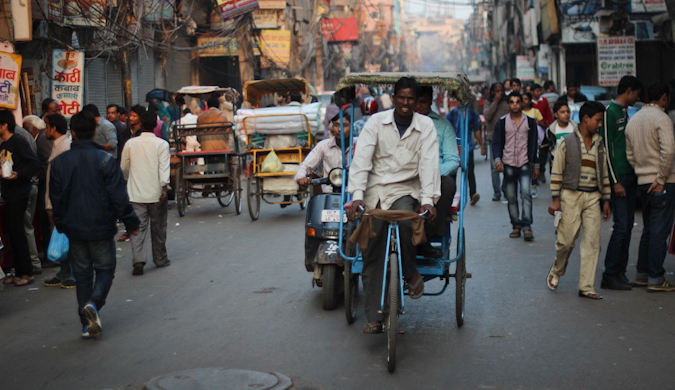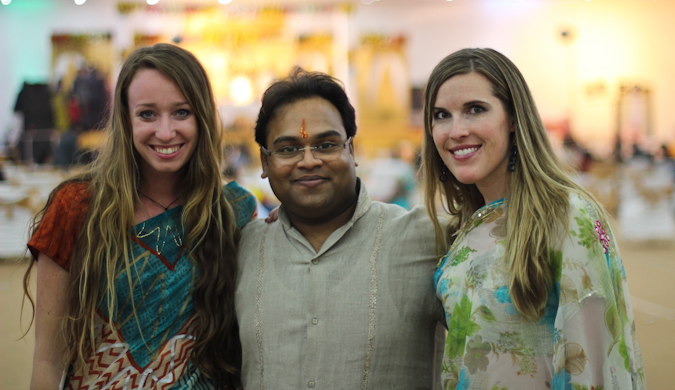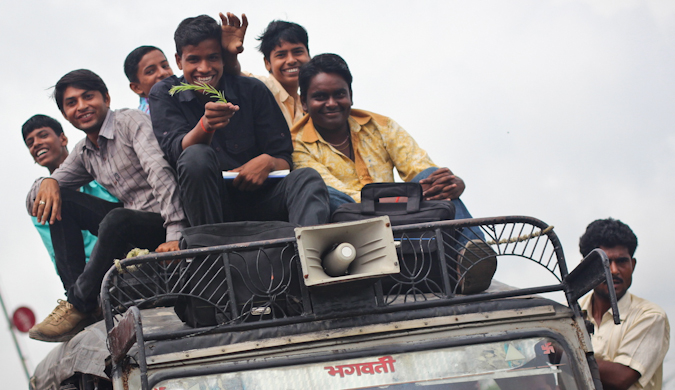The issue of women’s safety in India has been in the news
frequently lately. Many women have expressed concerns about traveling
there, and many more have opted not to go at all. I’ve never been to
India — and I’m also not a woman — but I feel this is an important
subject to discuss.Today, please welcome Candace Rardon, who spent many months traveling around India by herself, to discuss safety and solo travel in India.
My introduction to India came behind the wheel of an auto-rickshaw.
For two weeks in 2011, my friend Citlalli and I took part in the Rickshaw Run, driving one of India’s ubiquitous three-wheeled vehicles 2,000 miles across the country.
On our fifth morning, we spent three hours wrestling our way through an 18-mile traffic jam in Bihar, a state known for its poverty and violence. After the second hour, I needed a break from dodging trucks and buses and cows, and so we pulled over.
Instantly a crowd of about 20 men surrounded our rickshaw. Citlalli and I nervously said hello, hoping to break the tension we felt as two foreign women in such a situation, when a white-haired shopkeeper approached us. In his hand were two tiny cups of sweet, steaming chai.
I tried to explain that we were out of small change and couldn’t pay him for the tea, but he insisted, saying, “I may be poor, but I still have a heart.”

I am aware of the various threats facing Indian women and foreign visitors alike: staring, groping, stalking, and most seriously, rape. With such threats forever hanging over a female traveler’s head, it makes sense to wonder if India is worth the worry and the hassle. Why not skip it entirely in favor of less troublesome destinations?
One reason: No country will fascinate and frustrate you more.
While travel in India will require heightened attention and common sense, let me assure you it is worth it. Although I did encounter men who stared at me inappropriately, there were countless others who in no way treated me as a sexual object: farmers and pharmacists, shopkeepers and teachers, men whose warmth, kindness, and compassion moved me in unexpected ways.
The man who gave us chai in Bihar was only the beginning. There was the time I had Delhi belly in Bhubaneswar and a hotel worker brought me yogurt with sugar; the time I was waiting for a friend’s flight to arrive at 1:00 am, and a guy I struck up a conversation with invited us to his sister’s wedding the next week; and the time I jumped off a train in Chennai and a man led me across the street to buy gauze and disinfectant to patch up my skinned knee.
It is impossible to stereotype a nation of one billion people, and bad experiences there will naturally be impossible to avoid. The challenge lies in refusing to accept such occurrences as the status quo, while still choosing to focus on the positive. This might sound trite or naïve, but it’s a choice that India demands of you.
Drawing on my own time in India as well as advice from other women who have traveled there extensively, here are 11 tips to help ward off unwanted situations — but also keep you open to positive experiences:

As you would for any destination, spend time learning about India and its customs before arriving. Go in with your eyes wide open, having taken the necessary steps to be educated and prepared, and understand that what awaits you there may be vastly different from what you’re used to.
Beth Whitman, founder and CEO of Wanderlust and Lipstick and WanderTours, has been leading both female-only and co-ed tours to India since 2009 — and not once has a woman on a WanderTour had any issue with her safety.
“Don’t go to regions where crime (particularly drugs) are rampant,” Beth writes. “There are places in India like this. Read the guidebooks and forums to determine if your destination falls into that category.”
In my own experience, the most important preparation for India was mental. Before going for the first time, it felt like I was getting ready to visit a different planet. Between worrying about what shots to get, what would happen when I got sick for the first time, and whether or not I would be safe, India required a huge mental adjustment — this wouldn’t be another beach holiday or European city break.

This goes without saying, but deserves repeating: India is a conservative country, so be respectful of that by covering your shoulders and legs and watching your cleavage.
Consider wearing Indian attire such as a kurta (long, loose tunic) or a shalwar kameez suit, which can easily be picked up once you arrive at local markets or from stores like Fabindia. This is by no means a guarantee of your safety and may not change the way men act toward you, but there’s no need to draw unnecessary attention to yourself.
The only possible exception to this is Goa, whose well-known beaches have become increasingly westernized. But be aware that although it is more acceptable to wear a bikini here, you might still attract unwanted advances.

I am never a fan of not telling the truth on the road. I believe that, when appropriate, it’s as important to share our own customs and ways of life with other cultures as it is to learn about theirs. This mutual exchange is one of the many things I love about travel.
The fact that I am unmarried at 27 and travel alone was often surprising to the Indians I met, and I enjoyed our conversations about our different cultures — conversations that might not have taken place had I worn a fake wedding ring or pretended that my fake husband works in Mumbai.
While eating dinner alone in Mumbai one night, an Indian man sitting at another table asked if he could join me. Our conversation was interesting and I was glad for the chance to chat, but afterward he asked if we could go somewhere else for a drink or meet again the next night. I didn’t feel comfortable doing so on my own, and told him that I already had plans with friends.
Use discernment and get a sense of whether or not such a white lie may help protect you. Beth Whitman specifically recommends this strategy when staying alone at a hotel. “Consider making mention of a husband or boyfriend who is arriving shortly, and don’t make friendly conversations with the male staff. Instead, become friends with any women, if they happen to work there.”
My introduction to India came behind the wheel of an auto-rickshaw.
For two weeks in 2011, my friend Citlalli and I took part in the Rickshaw Run, driving one of India’s ubiquitous three-wheeled vehicles 2,000 miles across the country.
On our fifth morning, we spent three hours wrestling our way through an 18-mile traffic jam in Bihar, a state known for its poverty and violence. After the second hour, I needed a break from dodging trucks and buses and cows, and so we pulled over.
Instantly a crowd of about 20 men surrounded our rickshaw. Citlalli and I nervously said hello, hoping to break the tension we felt as two foreign women in such a situation, when a white-haired shopkeeper approached us. In his hand were two tiny cups of sweet, steaming chai.
I tried to explain that we were out of small change and couldn’t pay him for the tea, but he insisted, saying, “I may be poor, but I still have a heart.”
Why go to India?

I am aware of the various threats facing Indian women and foreign visitors alike: staring, groping, stalking, and most seriously, rape. With such threats forever hanging over a female traveler’s head, it makes sense to wonder if India is worth the worry and the hassle. Why not skip it entirely in favor of less troublesome destinations?
One reason: No country will fascinate and frustrate you more.
While travel in India will require heightened attention and common sense, let me assure you it is worth it. Although I did encounter men who stared at me inappropriately, there were countless others who in no way treated me as a sexual object: farmers and pharmacists, shopkeepers and teachers, men whose warmth, kindness, and compassion moved me in unexpected ways.
The man who gave us chai in Bihar was only the beginning. There was the time I had Delhi belly in Bhubaneswar and a hotel worker brought me yogurt with sugar; the time I was waiting for a friend’s flight to arrive at 1:00 am, and a guy I struck up a conversation with invited us to his sister’s wedding the next week; and the time I jumped off a train in Chennai and a man led me across the street to buy gauze and disinfectant to patch up my skinned knee.
It is impossible to stereotype a nation of one billion people, and bad experiences there will naturally be impossible to avoid. The challenge lies in refusing to accept such occurrences as the status quo, while still choosing to focus on the positive. This might sound trite or naïve, but it’s a choice that India demands of you.
Drawing on my own time in India as well as advice from other women who have traveled there extensively, here are 11 tips to help ward off unwanted situations — but also keep you open to positive experiences:
1. Do your homework

As you would for any destination, spend time learning about India and its customs before arriving. Go in with your eyes wide open, having taken the necessary steps to be educated and prepared, and understand that what awaits you there may be vastly different from what you’re used to.
Beth Whitman, founder and CEO of Wanderlust and Lipstick and WanderTours, has been leading both female-only and co-ed tours to India since 2009 — and not once has a woman on a WanderTour had any issue with her safety.
“Don’t go to regions where crime (particularly drugs) are rampant,” Beth writes. “There are places in India like this. Read the guidebooks and forums to determine if your destination falls into that category.”
In my own experience, the most important preparation for India was mental. Before going for the first time, it felt like I was getting ready to visit a different planet. Between worrying about what shots to get, what would happen when I got sick for the first time, and whether or not I would be safe, India required a huge mental adjustment — this wouldn’t be another beach holiday or European city break.
2. Dress appropriately

This goes without saying, but deserves repeating: India is a conservative country, so be respectful of that by covering your shoulders and legs and watching your cleavage.
Consider wearing Indian attire such as a kurta (long, loose tunic) or a shalwar kameez suit, which can easily be picked up once you arrive at local markets or from stores like Fabindia. This is by no means a guarantee of your safety and may not change the way men act toward you, but there’s no need to draw unnecessary attention to yourself.
The only possible exception to this is Goa, whose well-known beaches have become increasingly westernized. But be aware that although it is more acceptable to wear a bikini here, you might still attract unwanted advances.
3. Discern when doctoring the truth may help you

I am never a fan of not telling the truth on the road. I believe that, when appropriate, it’s as important to share our own customs and ways of life with other cultures as it is to learn about theirs. This mutual exchange is one of the many things I love about travel.
The fact that I am unmarried at 27 and travel alone was often surprising to the Indians I met, and I enjoyed our conversations about our different cultures — conversations that might not have taken place had I worn a fake wedding ring or pretended that my fake husband works in Mumbai.
While eating dinner alone in Mumbai one night, an Indian man sitting at another table asked if he could join me. Our conversation was interesting and I was glad for the chance to chat, but afterward he asked if we could go somewhere else for a drink or meet again the next night. I didn’t feel comfortable doing so on my own, and told him that I already had plans with friends.
Use discernment and get a sense of whether or not such a white lie may help protect you. Beth Whitman specifically recommends this strategy when staying alone at a hotel. “Consider making mention of a husband or boyfriend who is arriving shortly, and don’t make friendly conversations with the male staff. Instead, become friends with any women, if they happen to work there.”








No comments:
Post a Comment